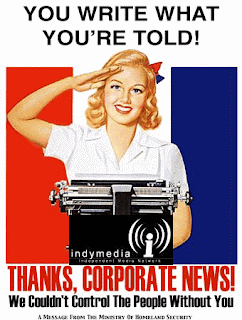The book we have been reading touches on multiple ways citizen journalism has impacted the world and how the people around the world view this new source of information. There are professional journalists who strongly oppose citizen journalism and then there are those that see it as an expansion of the relationship the media has with its viewers. The main question that surrounds citizen journalism is the lack of authenticity and accountability. The book shows many instances where certain people have done serious harm due to not checking facts or simply trying to cause harm. Citizen journalists are not held to the code of ethics as professional journalists which has the potential to cause economic issues, possible damage to one's reputation, and even can put other's safety at risk. With all these negatives, one might question why the people do not just leave the story telling to the professionals.
 Another major positive to citizen journalism is that it allows people to show all angles of a story without a mainstream media outlet filtering certain parts out. Mainstream news tends to have a political agenda and will pick and choose what stories to tell and what stories to leave out. This raises the question if anyone should have the power to control what news and stories people hear? These online sources for anyone and everyone to posts things provide areas where people can present unbiased stories. It comes down to people having choices from where they get their news. There are no longer only three or four news stations to get information from but thousands that the Internet is home to and a good portion of these alternatives are citizen journalists.
Another major positive to citizen journalism is that it allows people to show all angles of a story without a mainstream media outlet filtering certain parts out. Mainstream news tends to have a political agenda and will pick and choose what stories to tell and what stories to leave out. This raises the question if anyone should have the power to control what news and stories people hear? These online sources for anyone and everyone to posts things provide areas where people can present unbiased stories. It comes down to people having choices from where they get their news. There are no longer only three or four news stations to get information from but thousands that the Internet is home to and a good portion of these alternatives are citizen journalists.Ultimately citizen journalism has taken the world by storm and is changing the way people get their news and who they obtain it from. There are positives and negatives to any situation but I believe the solution to the few negatives that citizen journalism presents is for people to do research on what they hear. If a news story is going to alter your choices in life then, in my opinion, one must research this story through multiple mediums. The mainstream media can sway your opinion and citizen journalism may not always be reliable therefore one must check multiple resources.
The world is evolving and people are finally starting to participate in it. Individuals are making their opinions known and voices heard through global platforms such as YouTube. Susan Sontag, a literary icon and well known political activist, said, "Do stuff, be clenched, curious. Not waiting for inspiration's shove or society's kiss on your forehead. Pay attention. It's all about paying attention. Attention is vitality. It connects you with others. It makes you eager. Stay eager." People are paying attention to the world around them and broadcasting not only their stories but stories that the mainstream media may have considered "un-newsworthy." Citizen journalism has invited everyone to hear all stories of the world: unbiased and unscripted.
No comments:
Post a Comment